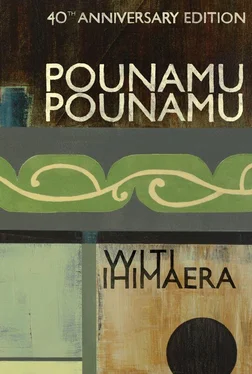Afterwards, the old lady insisted that I go and stay with her at their place. Lucky Ted Bland got to go back to his nice hotel, while I got taken to this whare in the bush somewhere, where I made the mistake — not realising the kuia was not on town supply — of asking if I could take a bath. So she heated some water in a copper, and she and her moko filled the bath bucket by bucket, and then I had to take my clothes off under the moon and suffer her ministrations and scolding as she soaped me up and washed me.
How did I feel? Like a puppy dog, in absolute bliss.
Although there’s not much bliss in ‘The Whale’, what’s important about this story can be said about the whole collection: Pounamu Pounamu provided a ‘greenprint’ for all my fiction to come. The same characters in all these stories turn up throughout my fiction. The tribal clans of Waituhi appear in The Matriarch, Whanau and Whanau II, The Dream Swimmer and Bulibasha, King of the Gypsies , and so on. And the family in ‘One Summer Morning’, although not named, becomes the Mahana family in my fiction, the Maori equivalent of Katherine Mansfield’s Burnell family.
As far as ‘The Whale’ is concerned, I was able to rework the elements in my novel, The Whale Rider , and turn its themes into something redemptive and triumphant.
One step further now.
Do not listen to the wailing, Tama. Do not listen to the women chanting their sorrows, the soaring waiata tangi which sings alone and disconsolate above the wailing. It is only the wind, Tama. Do not listen to the sorrow of the marae.
Do not look up, Tama. The marae is strung with electric bulbs and black shadows walk within the blazing light. If you look up, you will see the many faces of grief, every face pale and shrouded in the dark garments of mourning. You will see your father where he lies on the cold stone and your mother keeping vigil over him this long night. Do not look up. Else you will be lost.
‘Mr Mahana? Gisborne calling, Mrs Kingi on the line.’
‘Hello, Marama!’
‘Hello, Tama.’
My sister’s voice is calm and soft. She pauses for a moment.
‘You’ll have to come home, Tama. Dad’s dead.’
Daddy, why did my Nani Teria die?
Because she was old.
Are you old, Daddy?
No, Tama.
Don’t grow old, Daddy. Please, don’t grow old.
Step firmly, Tama. One step. Now the next. Although the earth may sway and reel under your feet, step firmly. The earth sorrows with you.
Step firmly, Tama.
‘How’s Mum, Marama?’
‘She’s taking it well, Tama. She helped wash Dad’s body, got him ready, dressed him … he was so heavy. We took him to Rongopai this morning.’
Daddy, why did we bring our Nani here?
Because Rongopai is our meeting house, Tama. This was where she was born, where I was born, where you were born. This is our home, Tama. And on the hill next to the meeting house is where all our people are buried. I will be buried there one day.
No you won’t, Daddy.
One day, Son.
The shadow of an old man advances across the light. It is your grand-uncle, Tama. He is welcoming you home to the funeral of your father. Listen to his words, listen. But do not look up. The old man is chanting your whakapapa, your lineage, and your links with Rongopai. His voice threads itself within the sad wailing. Listen to the words, Tama. But do not look up. Not yet. Wait until his welcome is ended and the silence falls within which every ear strains to hear your reply. Not yet, Tama.
‘Quite suddenly, about three o’clock this morning. Mum woke up and there he was, cold, lying beside her. Mum rang me about five, you know how early Mum gets up. So me and Hata went out to her, and you know what Mum was doing? There she was, sitting beside Dad, just knitting, knitting a jersey for Dad, waiting for us, knitting, just knitting.’
‘Oh, Marama.’
When the welcome is ended, Tama, then you may look up. Look your grand-uncle proudly in the face and do not think of tears. The wailing will sigh away like a drifting wind. Then will be the time to speak.
‘Anything wrong, Tama?’
Mr Ralston puts his hands on my shoulders. I turn. He sees my tears.
‘My father, my father is dead, Mr Ralston. I must go home, Mr Ralston, pack my bags and go home. My father is dead.’
Daddy, why does the man throw Nani Teria’s suitcases and photographs and things in the hole?
Because that is where Nani is, Tama. And because that is our way. What do we need Nani’s things for?
Has my Nani really gone now?
Yes, Son. She’s gone now and you’ve got no Nani any more.
She was a good Nani, wasn’t she Daddy. Why did she have to go into the earth?
Do not think of sorrow, Tama. You must make your father proud. Send your words loud and ringing that he may hear. Bear yourself with pride. Answer your grand-uncle’s loving words with your own. Address the assembly, Tama.
‘Was your father an old man?’
‘No, Mr Ralston. About fifty-seven.’
I watch the windscreen wipers swish across the window, sweeping away the rain.
‘He was a good man, Mr Ralston.’
The telephone poles bend past. And here is Wellington Airport, glistening and wet.
It always rains when a Maori dies, Tama.
Why, Daddy?
The wailing makes the sky sad, and even if it is a bright summer day and there are no clouds, it rains. The sky mourns for your Nani too, Tama. She was a good woman.
Now is the time to speak, Tama. Proclaim to all who stand on the marae that you are Tama Mahana, eldest son of Rongo Mahana who was the son of Eruera Mahana. That you are of the Whanau A Kai, that your lineage is long and renowned. Proclaim that Rongopai is your family hearth, your birthright, and that you are pleased to stand before your whare tupuna. Let all who hear you know that you are indeed a Mahana. It is a proud name and your people are a proud people. You must be proud, Tama.
‘I’m afraid, Marama.’
The lights of Waituhi are near and already I can hear the sorrows of Rongopai marae whispering in the wind.
‘Almost there, Tama.’
The car turns into the gateway, the headlights flickering across the marae.
‘I’m afraid, Marama.’
‘Kia kaha, Tama. Be strong.’
I close my eyes, tightly, tightly closed.
Where are you, Daddy?
I’m here, Son.
I cannot feel your hand, Daddy. Hold my hand so that I know that you are here with me. It is dark and I am afraid. Hold my hand.
One step. Then one step further now.
After you have completed the initial ceremonials, Tama, let your voice be small so that every person among the assembly must strain to hear your words. Tell them that grief is in your heart and your body is a dark and empty shell in which your thoughts gather and produce tears. Tell them that you have come home to do homage to your father.
Hush, Tama. Do not cry so much.
But she was a good Nani, she was good to me, Daddy.
Then it is right for you to weep, Tama. But never forget that the sun always rises.
When, Daddy? When?
Do not falter, Tama. Remember that you are your father’s son. You are the eldest son and the example is yours to set. Do not let your voice drift, as if it were an empty canoe adrift on the sea. Take up the paddle, strike deep into the water. Look upon your mother where she sits weeping. She is your guiding star. Point your prow toward that star and let her know that you are here.
‘Let me speak to Mum, Marama.’
Читать дальше












